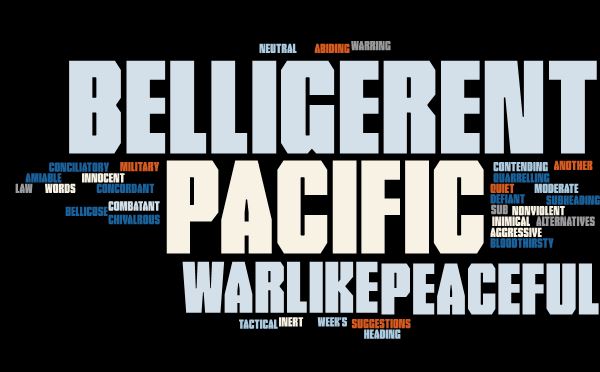
A series offering writers help to make their work more accessible, interesting, varied, accurate and effective by exploring similar and dissimilar words. It also gives language learners insights into some peculiarities of English.
A good thesaurus provides substitutes for the idea of a word, but not all suggestions are true synonyms. Context is vital. Placing alternative words in the same sentence to see whether they actually make sense is one way of checking suitability. But it’s not foolproof, so a good dictionary is essential.
I prefer the 1987 edition of Roget’s Thesaurus for word selection. And my dictionary of choice is the two-volume Shorter Oxford English Dictionary. But I try to dig the best word from my overcrowded memory first: it’s good mental exercise. Other books of words, which I consult when the appropriate term escapes me, sit on the reference shelf behind me.
So, to this week’s words: Pacific/Belligerent
Pacific – Roget gives these headers: inert, moderate, concordant, peaceful, amiable. Under the subheading, ‘peaceful’, there are (46) more suggestions, including quiet, innocent, law-abiding, nonviolent, conciliatory and neutral.
Belligerent – Roget lists these headers: quarrelling, defiant, contending, warring, warlike, combatant, inimical. Under the sub-heading ‘warlike’ are another 34 alternatives, including bellicose, aggressive, bloodthirsty, military, chivalrous and tactical.
These two words can operate as antonyms and it’s in that capacity I’m examining them here.
Let’s look at usage for pacific.
‘Many global organisations have pacific principles at their roots and seek an end to attempts to solve international conflict through violent means.’
Here, we could substitute ‘nonviolent’ and ‘conciliatory; for ‘pacific’ without altering the meaning of the sentence. However, ‘law-abiding’ would require a change in the structure. And ‘quiet’, ‘innocent’ and neutral would substantially change the meaning.
Now let’s look at usage for belligerent.
‘Politics seems to be dominated by sociopaths with belligerent outlooks and this appears to apply even more in the case of political leaders.’
In this case, we could substitute ‘bellicose’ and ‘aggressive’ with no real change in meaning. The use of ‘military’ or ‘bloodthirsty’ would alter the meaning substantially. And using ‘chivalrous’ or ‘tactical’ would render the sentence as nonsense.
For language learners, there’s a great group page on Facebook, which you can find through this link.
I welcome observations and suggestions here. Please use the comments section below for your ideas and thoughts.
By the way, a Google search today for ‘Writers Help’ brought up 164,000,000 results. One post from this series was 4th in the list and a second was 6th! So, it appears you’re in good company when you read these posts.
Antonyms can be difficult to discover and thesauruses generally fail to give examples. When utterly lost for such an opposite, I grab ‘The New Nuttall Dictionary of English Synonyms and Antonyms’ published 1986, which generally resolves my dilemma. I’m sure other such volumes are readily available.



I have never seen pacific used in that context before, and I’m not entirely sure I’d use it in my writing as I’m sure that few other people have either.
My favorite dictionary is the Penguin dictionary of synonyms and antonyms. It never lets me down.
LikeLiked by 1 person
It can be risky to use ‘unusual’ words, Roger. However, ‘pacific’ is the root for ‘pacifist’ and is therefore actually quite widely recognised though, as you say, not frequently used. For me, the beauty of English lies in its amazing variety of words to express the same, or similar, things. Of course, we can softly educate readers by using words in unusual ways, as long as we provide clear context. For some readers this is another reason for reading widely. I recall that I always had to have a dictionary handy when reading Iris Murdoch and, as a result, expanded my vocabulary.
Thanks for the reference to the Penguin Dictionary, which will help other readers with those searches for antonyms.
LikeLiked by 1 person